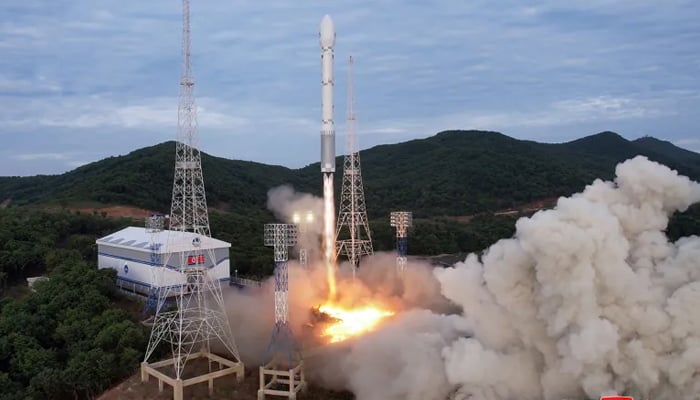"Flights of initial stages were normal, but the launch failed due to an error in the emergency blasting system," KCNA says 
The Chollima-1 rocket, carrying a spy satellite, takes off from an undisclosed location in North Korea on May 31, 2023. — AFP
After its second bid to launch a satellite into space, North Korean media reported Thursday that its efforts have once again failed to send a spy satellite into Earth's orbit citing the "problems" as the vehicle reached third stage.
According to the Korean Central News Agency, "the flights of the first and second stages of the rocket were normal, but the launch failed due to an error in the emergency blasting system during the third-stage flight."
North Korea earlier claimed that it fired a "space launch vehicle," southwards from North Phyongan province and "traversed the international airspace above waters west of Ieodo," referring to the Socotra Rock in the Yellow Sea.
National Aerospace Development Administration said that it would conduct the third reconnaissance satellite launch in October after thoroughly probing the reason and taking measures, KCNA reported.
While reacting toward the launch, South Korean Joint Chiefs of Staff was quoted as saying by Yonhap: "Our military is maintaining a full readiness posture and closely coordinated with the United States, while simultaneously elevating our security posture."
The launch was first signalled by the Japanese government, which said the North had fired a suspected ballistic missile.
The Kyodo news agency said the projectile had flown over Japanese territory.
Pyongyang told Japan's coast guard Tuesday that its launch would take place between August 24 and 31, prompting Tokyo to mobilise ships and its PAC-3 missile defence system in case anything was to land in its territory.
Seoul has said such a launch would be "an illegal act" because it violates UN sanctions prohibiting the North from tests using ballistic technology, which is used for both space launches and missiles.
First failed attempt
In May, Pyongyang launched what it described as its first military reconnaissance satellite, but the rocket carrying it, the "Chollima-1" — named after a mythical horse that often features in official propaganda — plunged into the sea minutes after takeoff.
The crash sparked a complex, 36-day South Korean salvage operation involving a fleet of naval rescue ships, minesweepers and deep-sea divers.
The retrieved parts of the rocket and the satellite were analysed by experts in South Korea and the US, who later said it had no military utility as a reconnaissance satellite.
North Korean leader Kim Jong Un has made the development of a military spy satellite a top priority.
North Korea's ruling party "bitterly" criticised the officials responsible for the crash in June.
Relations between the two Koreas are at their lowest point in years, and diplomacy is stalled after failed attempts in recent years to discuss Pyongyang's denuclearisation.
Kim has declared North Korea an "irreversible" nuclear power and has called for ramped-up arms production, including tactical nuclear weapons.












